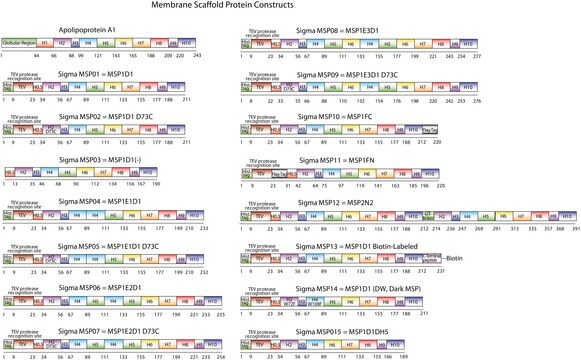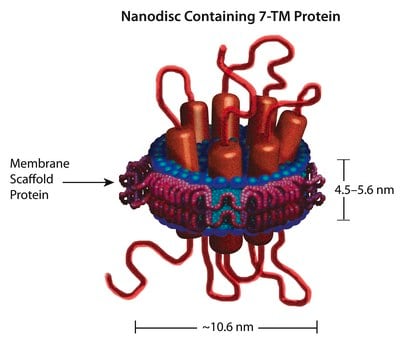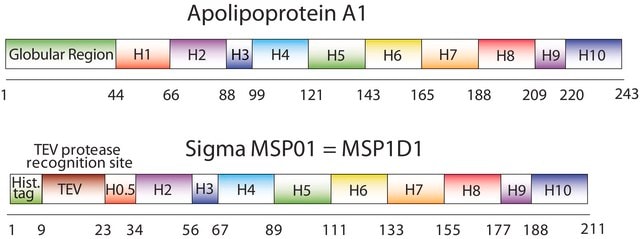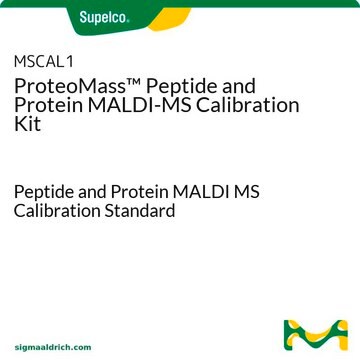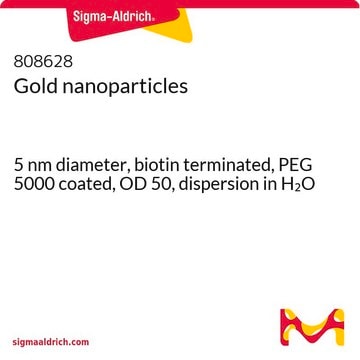MSP13
Membrane Scaffold Protein 1D1 BTN
recombinant, expressed in E. coli, Biotin labeled
Synonym(s):
1D1 BTN Protein, Membrane Protein Scaffold, Scaffold Protein 1D1 BTN
About This Item
Recommended Products
recombinant
expressed in E. coli
Quality Level
Assay
≥90% (SDS-GE)
form
buffered aqueous solution
mol wt
26,900.1 Da by calculation (without biotin)
solubility
water: soluble
shipped in
ambient
storage temp.
−20°C
General description
The first MSP, MSP1, was engineered with its sequence based on the sequence of A-1, but without the globular N-terminal domain of native A-1. The Membrane Scaffold Protein 1D1 (MSP1D1) variant of MSP1 deletes the first 11 amino acids in the Helix 1 portion (referred to as “H0.5” in the accompanying figure) of the original MSP1 sequence. The MSP1D1 BTN variant of MSP1D1 features an enzymatically biotinylated additional 20-amino acid sequence at the C-terminus of MSP1D1.
Nanodisc technology is an approach to render membrane proteins soluble in aqueous solutions in a native-like bilayer environment, where the membrane proteins remain stable and active. The Nanodisc concept is derived from high density lipoprotein (HDL) particles and their primary protein component, apolipoprotein. The Nanodisc is a non-covalent structure of phospholipid bilayer and membrane scaffold protein (MSP), a genetically engineered protein, which mimics the function of Apolipoprotein A-1 (ApoA-1)
Application
Biochem/physiol Actions
Legal Information
- 7,691,414 Membrane scaffold proteins
- 7,662,410 Membrane scaffold proteins and embedded membrane proteins
- 7,622,437 Tissue factor compositions and methods
- 7,592,008 Membrane scaffold proteins
- 7,575,763 Membrane scaffold proteins and tethered membrane proteins
- 7,083,958 Membrane scaffold proteins
- 7,048,949 Membrane scaffold proteins
Storage Class Code
12 - Non Combustible Liquids
WGK
WGK 2
Flash Point(F)
Not applicable
Flash Point(C)
Not applicable
Choose from one of the most recent versions:
Certificates of Analysis (COA)
Don't see the Right Version?
If you require a particular version, you can look up a specific certificate by the Lot or Batch number.
Already Own This Product?
Find documentation for the products that you have recently purchased in the Document Library.
Customers Also Viewed
Protocols
Nanodisc technology aids membrane protein solubilization, overcoming associated challenges in diverse protein classes.
Nanodisc technology aids membrane protein solubilization, overcoming associated challenges in diverse protein classes.
Nanodisc technology aids membrane protein solubilization, overcoming associated challenges in diverse protein classes.
Nanodisc technology aids membrane protein solubilization, overcoming associated challenges in diverse protein classes.
Our team of scientists has experience in all areas of research including Life Science, Material Science, Chemical Synthesis, Chromatography, Analytical and many others.
Contact Technical Service